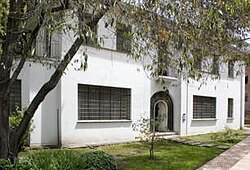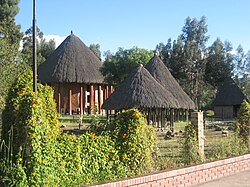| Name | Spanish name | Location | Type | Image |
|---|
| Art Collection of the Bank of the Republic [ es ] | Colección de Arte del Banco de la República | Bogotá | Art |  |
| Bogotá Museum of Modern Art | Museo de Arte Moderno de Bogotá | Bogotá | Art |  |
| Children's Museum of Bogotá | Fundación Museo de los Niños | Bogotá | Children's |  |
| Fragmentos | Fragmentos, Espacio de Arte y Memoria | Bogotá | Art |  |
| Gold Museum, Bogotá | Museo del Oro | Bogotá | Archeology |  |
| International Museum of the Emerald | Museo Internacional De La Esmeralda | Bogotá | Mineral | |
| Jorge Eliecer Gaitan Museum | Casa Museo Jorge Eliecer Gaitan | Bogotá | History |  |
| José Royo y Gómez Geological Museum | Museo Geologico José Royo y Gómez | Bogotá | Science |  |
| Maloka Museum | Maloka | Bogotá | Science |  |
| Miguel Urrutia Art Museum | Museo de Arte Miguel Urrutia | Bogotá | Art |  |
| Military Museum of Colombia [ es ] | Museo Militar de Colombia | Bogotá | Military |  |
| Museo Botero | Museo Botero | Bogotá | Art |  |
| Museo Casa de Moneda | Museo Casa de Moneda | Bogotá | Numismatics |  |
| Colonial Museum of Bogotá [3] | Mueso Colonial | Bogotá | Art |  |
| Museum of Contemporary Art of Bogotá | Museo de Arte Contemporáneo de Bogotá | Bogotá | Art |  |
| National Museum of Colombia | Museo Nacional de Colombia | Bogotá | National |  |
| Natural History Museum of Bogotá [4] | Museo de Historia Natural | Bogotá | History | |
| Planetarium of Bogotá | Planetario de Bogotá | Bogotá | Science |  |
| Quinta de Bolívar | Quinta de Bolívar | Bogotá | History |  |
| Museum of the Self-Built City [ es ] | Museo de la Ciudad Autoconstruida | Ciudad Bolívar, Bogotá | History, Urban Studies |























































